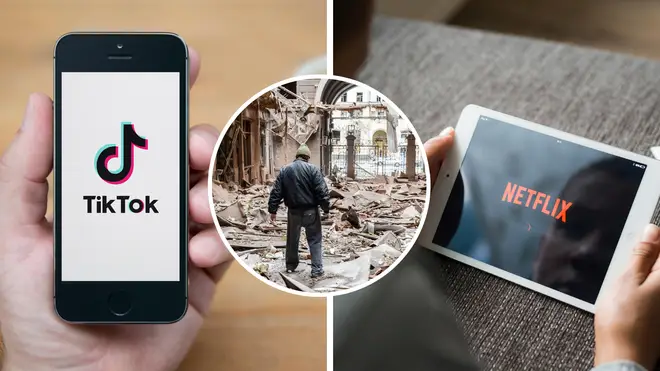
Shelagh Fogarty 1pm - 4pm
7 March 2022, 12:57 | Updated: 7 March 2022, 12:59

TikTok and Netflix have become the latest companies to restrict or suspend their operations in Russia as a result of the invasion of Ukraine.
In a statement posted to Twitter, Chinese-owned TikTok said it was suspending livestreaming and new content from Russia to protect employees and users as a result of the country's new law banning the spread of "misinformation" about the war in Ukraine.
"TikTok is an outlet for creativity and entertainment that can provide a source of relief and human connection during a time of war when people are facing immense tragedy and isolation," read the statement.
Read more: 'I am scared about everything': LBC speaks to Ukrainian refugees on Polish border
Watch: Moment bomb shelter in besieged Kyiv falls silent as young girl sings 'Let it Go'
"However, the safety of our employees and our users remain our highest priority.
"In light of Russia's new 'fake news' law, we have no choice but to suspend livestreaming and new content to our video service while we review the safety implications of this law. Our in-app messaging service will not be affected.
"We will continue to evaluate the evolving circumstances in Russia to determine when we might fully resume our services with safety as our top priority."
2/ In light of Russia's new ‘fake news’ law, we have no choice but to suspend livestreaming and new content to our video service while we review the safety implications of this law. Our in-app messaging service will not be affected.
— TikTokComms (@TikTokComms) March 6, 2022
TikTok spokesperson Hilary McQuaide said the app had become "view-only" - and even then users can only see older videos, and only those posted from Russia.
Netflix has also stopped operating there, saying: "Given the circumstances on the ground, we have decided to suspend our service in Russia."

Minister: It is a badge of honour Putin criticised British sanctions
The Kremlin has introduced a new law that means people who spread fake information about the military and the war in Ukraine could be jailed for up to 15 years.
But the definition of "fake information" is problematic because the Kremlin itself has been accused of pedalling a false narrative about the war.
Russia has repeatedly said the war in Ukraine is actually a "special military operation" to de-Nazify it.
Read more: Fifteen year jail for protesting against the war: Putin's new crackdown against dissent
Read more: ‘God will not forgive’: Zelenskyy condemns Russian slaughter of civilians fleeing Ukraine
In keeping with this narrative, children in Russia have been given virtual lessons on "why the liberation mission in Ukraine is a necessity", the "danger Nato represents to our country", and "why Russia stood up for the protection of the civilians of the Donetsk and Luhansk People's Republics".
Russia has made moves to ban anything that challenges this story, including shutting independent news outlets, restricting social media sites such as Facebook and Twitter and arresting thousands of people protesting the war in the country's major cities.
It has also ensured state-owned media focuses on events in the Donbas region, and omits the destruction of cities such as Kyiv and Kharkiv.

Matthew Thompson reports from Polish-Ukrainian border amid refugee crisis
A captured Russian commander said on Sunday that Russian civilians as well as military personnel were being lied to about the war in Ukraine.
"We were told that... Ukraine's territory is dominated by fascists' regime. Nationalists, nazis have seized power," Lieutenant Colonel Astakhov Dmitry Mikhailovich told reporters.
He said they were sometimes able to get information "from some other sources" and so they "had some doubts", but they could do "little analysis".
"We did not know the situation for sure," he said.
Read more: Captured Russian commander says he's 'ashamed' of Russia's invasion of Ukraine
Read more: 'Total chaos': Home Office under fire for issuing 'just 50' visas to 1.7m Ukraine refugees
The captured officer pleaded with the west not to "judge too harshly", saying he knew now he was "100 per cent wrong" but that most Russian people's "guilt is that they are misinformed".
"I feel sorry for people left in Russia," he said.
"[They] are not guilty. Their guilt is that they are misinformed.
"Some do not even have internet. They have no chance to use something alternative.
"They are constantly brain-washed."